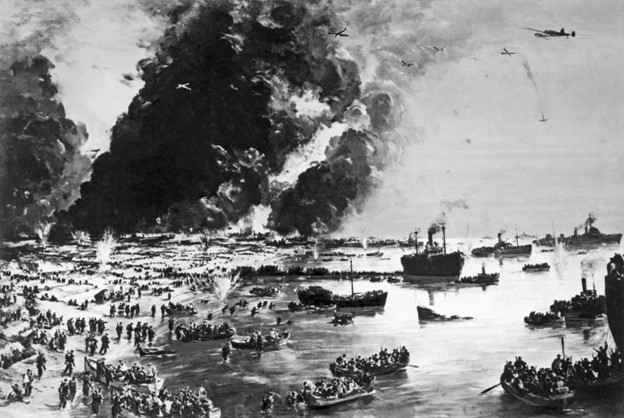
To listen to this reflection as a podcast, click here.
Every day during this season of Lent we’re looking at one of the “3:16” verses of the Bible, spotlighting some of the significant theological statements that happen to fall on the 16th verse of the third chapter of a number of Old and New Testament books.
“Shadrach, Meshach and Abednego replied to him, ‘King Nebuchadnezzar, we do not need to defend ourselves before you in this matter’” (Daniel 3:16).
But if not.
That was the cryptic three-word message that was sent to London across the English Channel in May 1940.
The British Expeditionary Force (BEF), comprised of 215,000 soldiers, which had journeyed to the European continent months earlier to help the Allies stop the advance of Nazi Germany, was trapped.
Along with French, Belgian, and Polish fighters, there were approximately 400,000 Allied soldiers pinned down on the beaches near the coastal town of Dunkirk.
No escape was contemplated.
Some 800,000 German soldiers were encamped nearby, awaiting orders to annihilate or capture the Allies. BEF commander Lord Gort was disconsolate. He wired London this colossal understatement: “I must not conceal from you that a great part of the BEF and its equipment will inevitably be lost in the best of circumstances.”
If the BEF was eliminated, England’s ability to wage war would be compromised for years. The British government briefly imagined a conditional surrender to Germany. Across the Atlantic, President Franklin Roosevelt considered how America might make a separate peace with Berlin.
That’s when several of the Brits in Dunkirk sent the message, “But if not.”
What in the world did that mean?
Those who received it in London recognized it as a quotation from the Bible. It comes from the third chapter of the book of Daniel. The prophet tells the story of three Hebrew men – Shadrach, Meshach, and Abednego – who are condemned by Nebuchadnezzar, king of Babylon, to be thrown into a fiery furnace for refusing to bow before an image of gold that represents the king. “What God will be able to rescue you from my hand?” Nebuchadnezzar roars. But the trio is unfazed.
They know that “the God we serve” has the power to do whatever he wants. In Daniel 3:16, they have the audacity to speak calmly to the Babylonians’ supreme leader: “We do not need to defend ourselves before you in this matter.” Just be chill, your majesty. You’re not in control here. God is. And if he wants, he can rescue us from a fiery death.
“But if not,” they say to the king (there are those three words) – even if God decides not to intervene on their behalf – “we will still not serve you or your gods” (Daniel 3:18).
Members of the British Expeditionary Force, their backs against the sea, were announcing that even if no one came to their rescue, they were still resolved to stand strong.
For reasons that have never been fully understood, Adolph Hitler signed a Halt Order. The German Army remained motionless for three days. That gave the Royal Navy the time it needed to organize an evacuation.
Between May 26 and June 4, the waters of the English Channel were astonishingly calm. Some 861 vessels – including tugs, barges, and private yachts – made repeated trips from the British coast to the trapped soldiers. As dramatized in Christopher Nolan’s 2017 film Dunkirk, that ragged flotilla of boats – many of them piloted by private citizens – had to dodge the deadly strafes of German fighters.
In all, 338,226 Allied soldiers were rescued in what came to be known as the Miracle of Dunkirk.
If God rescues us, we will be grateful. He can certainly do it.
But if not – if God doesn’t eliminate the cancer, or save the marriage, or provide the money, or ensure that a healthy baby is born – God is still God.
One of life’s great dramas is wrestling with whether he is still worth trusting, even when we do not understand his ways.
Only by holding on, even in the midst of disappointment, will we learn that truth for ourselves.
